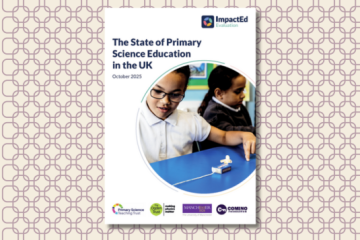State of Primary Science report published

Today sees the launch of a new report on the ‘State of Primary Science in the UK’ commissioned by the Primary Science Teaching Trust (PSTT) with The Ogden Trust and SEERIH (The University of Manchester), and supported by the Comino Foundation. The research was conducted by ImpactEd Group. ASE was a stakeholder for the project as a member organisation of the UK Primary Science Education Group, sharing our expertise and experience throughout the process.
The study builds on the Wellcome Trust’s 2017 State of the Nation report, offering an updated view of primary science teaching and leadership across the four UK nations.
The reports main findings are that while more schools now have designated science leaders and provide weekly science lessons, teacher confidence in teaching science has declined since 2017.
Drawing on data from more than 1,200 teachers, the report highlights both progress and persistent challenges:
• 96% of schools now have a designated science leader (up from 91% in 2017).
• Weekly science provision has increased from 75% to 96%.
• However, teacher confidence has fallen from 96% to 79% among science leaders and from 79% to 72% among other teachers.
• Fewer teachers report access to mentoring, regular science meetings or subject-specific CPD.
The report also finds that schools with a science leader demonstrate stronger provision overall, including more frequent science teaching, better access to resources, and higher perceptions that science is valued within school culture.
Marianne Cutler, ASE’s Director of Policy and Curriculum Innovation, commented on the report:
‘It's encouraging to note the positive developments since 2017, particularly the high percentage of primary schools reporting that science is taught weekly and having a dedicated science leader. However, the declines in science leader and teacher confidence and the continued lower profile for science compared with mathematics and English are concerning. The report is informative in comparing the findings across the four nations of the UK and will inform ASE’s policy and advocacy work in primary science.’
ASE's Primary Committee are running a discussion session about the report on 14th October, online, free for ASE members. The report will also be discussed as our Primary Keynote at our Annual Conference in January.
